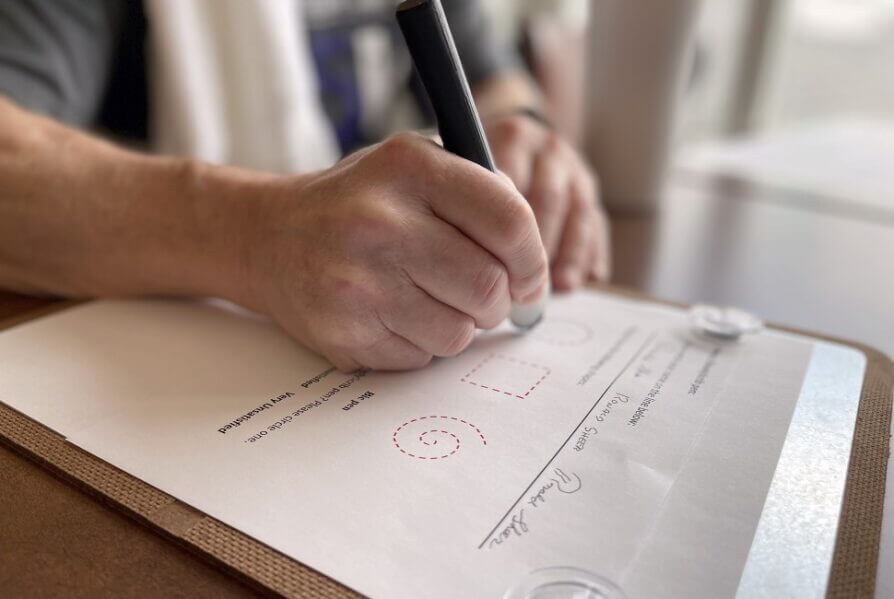When Izzy Mokotoff’s grandfather stopped writing his weekly letters to her in the spring of 2022, she knew she had to find a solution. Parkinson’s disease had slowly been wearing down her grandfather’s central nervous system, causing tremors that were making it impossible for him to write — which was one of his favorite things to do.
Parkinson’s is a debilitating brain disorder that causes the body to deteriorate and robs individuals of their independence due to uncontrollable movements, such as shaking, stiffness and difficulty with balance and coordination.
“When my pops called me over a year ago and told me there were no existing technologies to enable people with Parkinson’s to physically write, I just thought my grandparents weren’t googling a solution properly,” recalled Mokotoff, a junior at Northwestern’s Medill School of Journalism. “But it turns out, there truly isn’t anything out there.”
Deep dive into quality-of-life interventions
Mokotoff began what would become a deep dive into quality-of-life interventions, solutions for individuals living with conditions that may not improve the condition itself, but are aimed at improving patients’ lives and expanding their autonomy. Within the field of Parkinson’s, she found a dearth of research.
After Mokotoff talked about her frustrations with Alexis Chan, a junior studying biomedical engineering in the McCormick School of Engineering who shared a wall with Mokotoff in their sorority, the budding team began to form a solution. They came up with SteadyScrib, a unique pen and clipboard set carefully designed to enable users to write again after Parkinson’s has robbed their ability to do so.
The all-women led, undergraduate Northwestern startup believes it can impact quality of life and offer new options to patients. The team moved quickly into full startup mode with support from Northwestern’s Farley Center for Entrepreneurship and Innovation, where Mokotoff is working on a minor in entrepreneurship; the Segal Design Institute, where she’s working on a certificate in design; and The Garage, Northwestern’s student startup space.
“It’s inspiring to watch students identify a problem and then solve it,” said Hayes Ferguson, director of Farley and the team’s principal investigator. “Izzy and Alexis did just that in a relatively short time, creating something that’s personally meaningful and yet far-reaching in its impact.
In expanding the team, Mokotoff and Chan have stayed true to their all-women roots, from their industry mentor to their team directors. The two credit much of their confidence and expertise to a pre-accelerator program hosted by The Garage over the summer called Jumpstart that helps students with early-stage ventures over the course of 10 weeks.
“Before Jumpstart, we used what we had to make a prototype, which literally meant a Beauty Blender on an existing pen, and magnets I got at a dollar store and just ‘arts-and-crafting’ it to see if it was a feasible solution,” Chan said.
Iterating through several designs and pilots
Mokotoff said their crude prototype was enough for people at The Garage to see their vision and help point them down the right paths. The next several weeks would be filled with more designs and dozens of pilot tests with customers. And though Chan had no previous experience with a 3D printer, she said she learned quickly — after a few initial mishaps.
“By week four, Alexis had her minimum viable product done,” Mokotoff said. “She was cranking out prototypes, sometimes even two full ones in a day. I didn’t think she was going to be able to do it that quickly.”
Halfway through the program, the team began pilot testing. Through interviews with members of two local Parkinson’s groups, video chats, footage courtesy of Mokotoff’s pops and nani, as well as individual interviews with folks who visited The Garage space after hearing about SteadyScrib, Chan moved from a prototype with a grip that was impractically clunky to a sleek design that users found intuitive and effective.
The pen’s wide pliable grip makes holding it steadier, while ring magnets make the pen heavier and draw it to the galvanized steel clipboard, where paper is held in place to negate the effects of shaking and tremors. But they’re still not done iterating.
SteadyScrib took home both prizes at the end of the Jumpstart program — audience favorite and the first-place judge’s award.
“Izzy and Alexis worked tremendously hard during Jumpstart, designing a solution, testing it with actual Parkinson’s patients and coming back to The Garage to quickly iterate the next prototype,” said Mike Raab, executive director of The Garage. “Driven by their motivation to increase the independence and improve the lives of their customers, it’s impressive what they accomplished in a short period of time.”
Since its founding, SteadyScrib has tested the product on more than 40 individuals (with the first pen set shipped off to Pops) and created over 10 different prototypes. They recently were selected for the next round of the Venture E-Team Program, accepting a $20,000 grant and spot in the nationally recognized Propel workshop. They aim to release the pen at the end of the year.
Pops passed away peacefully on Dec. 4, 2022. The SteadyScrib team continues to work relentlessly, now in loving memory of Neal Charles Andelman, determined to help other people like Pops rediscover the joy of writing.
“SteadyScrib is a beautiful reminder of the love between a grandchild and her grandfather, and the impact that Pops’ legacy can have on the lives of many,” Mokotoff said.

